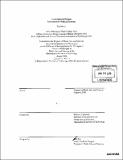Contestational design : innovation for political activism
Author(s)
Hirsch, Edward A., 1970-
DownloadFull printable version (46.17Mb)
Alternative title
Innovation for political activism
Other Contributors
Massachusetts Institute of Technology. Dept. of Architecture. Program in Media Arts and Sciences.
Advisor
William J. Mitchell.
Terms of use
Metadata
Show full item recordAbstract
This thesis presents contestational design, a unique form of design activity whose aim is promote particular agendas in contested political arenas. I propose a framework for analyzing contestational design processes, which I then apply to two initiatives that developed communications infrastructure for activist groups. The first case study is TXTmob, an SMS-broadcast system that I developed with an ad-hoc coalition of activists to support mass mobilizations during the 2004 Democratic and Republican National Conventions. It has been used by thousands of people and has inspired new projects in both the nonprofit and commercial sectors. The second case study is Dialup Radio, a telephone-based independent media system that I developed with a civil society organization in Zimbabwe. It was intended to disseminate activist information, particularly to Zimbabwe's rural poor. Despite limited infrastructure and government restrictions, several prototypes were produced and tested in Zimbabwe. After describing each case study individually, I turn to a comparison of their respective processes and the artifacts that each produced. Examining the cases side by side, I identify a set of common issues with which contestational designers contend at various points in the design process. Finally, I describe a set of organizing principles that distinguish contestational design from other kinds of design activity.
Description
Thesis (Ph. D.)--Massachusetts Institute of Technology, School of Architecture and Planning, Program in Media Arts and Sciences, 2008. Includes bibliographical references (leaves 134-142).
Date issued
2008Department
Program in Media Arts and Sciences (Massachusetts Institute of Technology)Publisher
Massachusetts Institute of Technology
Keywords
Architecture. Program in Media Arts and Sciences.